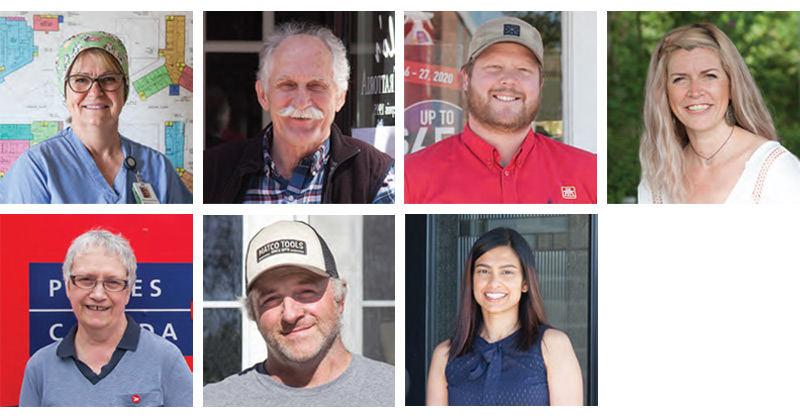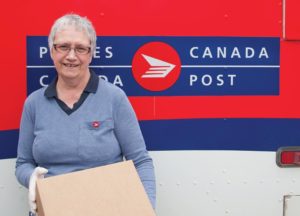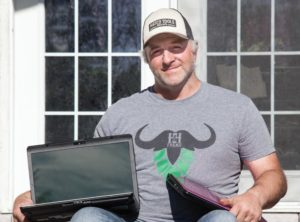
From top left to bottom right: Marilyn Petherick, Paul Dinkel, Evan Nash, Nicole Beatty, Pauline Janes, Tim Clapp & Karen Widling
Watershed is proud to feature sketches of seven positive, proactive community members who responded to the call – to continue to offer health care, education, counselling, or essential services when every circumstance was telling them to close the doors and turn out the lights.
They faced unprecedented challenges over the past months. There was no blueprint or template to follow. There was no instruction booklet. And yet somehow these people pulled together and managed. From child care to community care, they have cared for one another.
They are a reflection of the dedication and the perseverance that lives on in our neighbourhoods.
These are their stories…

Marilyn Petherick And the Infection Control Committee at Campbellford Memorial Hospital: Keeping the Doors Open
By Chris Cameron
Every day we witness the heroic efforts that front-line health-care workers are making in the battle against COVID-19. But who works behind the scenes to coordinate a hospital or clinic’s response to the crisis, so that the facility can provide quality care to patients while keeping their staff safe? Who keeps the doors open?
At Campbellford Memorial Hospital, this responsibility falls to Marilyn Petherick and her Infection Control Committee. CMH has had a pandemic response plan in place since 2009. The committee’s mandate is to maintain and implement that plan. Committee members include staff from all departments of the hospital – doctors, nurses, lab technicians, and representatives from maintenance, housekeeping, and security.
Marilyn has been a registered nurse for nearly four decades and is a certified infection control specialist. Normally she divides her time between working in the OR and infection planning. But in recent months she and her committee have shifted into overdrive to coordinate the hospital’s operational procedures in response to the COVID-19 pandemic.
In healthier times, Marilyn’s committee accumulates knowledge about what’s going on in the world in public health and makes plans for a future like the one we are experiencing now. “We learned a lot from SARS and H1N1,” she says, and that has helped a lot this time around.
The plan is working: the hospital’s Emergency and Radiology Departments as well as the lab are completely functional.
The work has its challenges, especially in the area of personal protective equipment (PPE). “PPE has always been a big part of any infection plan,” Marilyn notes, “but the equipment has typically been earmarked for flu outbreaks.” The shortfall is an ongoing and widespread problem.
One of the more visible phases in the hospital’s COVID-19 response plan was to restrict public entry to just the Emergency Department entrance and to screen everyone who uses that entrance. This restricted access is a critical component of the plan, as it helps keep both staff and patients safer.
“Nearly everyone has been receptive and cooperative,” says Marilyn, “which reflects on the community spirit of the citizens here.” A key part of the plan is to make a point of greeting visitors who walk into the hospital with a reassuring smile. “As we say, we’re all in this together.”
Receiving a reassuring smile on walking into a hospital seems about the most therapeutic thing ever.
Like the virus it is designed to combat, the pandemic response plan reaches into every corner of the hospital, making everyone’s buy-in an essential service. Campbellford Memorial Hospital recognizes that staff members are at their strongest when they are well informed. A major part of the plan involves communication – making sure everyone is working comfortably and knowledgeably, and that issues are addressed promptly.
“Access to information is vital,” Marilyn says. “Hospital management has been very supportive in this respect.” There are daily “huddle” meetings where everyone is encouraged to voice concerns, whether related to procedures, precautions, or morale.
With the typical modesty of health-care professionals, Marilyn gives credit for the plan’s success to everyone in the hospital as well as to all the visitors who have cooperated with the restrictions. Her colleagues are somewhat more forthcoming.
“Marilyn’s passionate and comprehensive approach to infection prevention and control is appreciated through normal times at Campbellford Memorial Hospital,” says Varouj Eskedjian, President and CEO of CMH. “She has been invaluable through this difficult time of the COVID-19 pandemic.”
Although they work away from the spotlight, it’s a privilege to describe Marilyn and her committee as vital members of our community, along with all those who work for little public recognition to keep the doors open.
Evan Nash: In a County of Heroes
By Lonelle Selbo
It provided no small thrill for the County to see so many instances of heroism sweeping across it in early spring of this year. The COVID-19 pandemic was ramping up more dramatically every day and as the threat grew, people in our community began to step up.
We watched the winemakers establish the local “caremongering” group and the distillers convert their operations to make hand sanitizer for our front lines. We saw the master craftsmen sew linen masks for the community and the County artists contribute to a virtual colouring book to buoy the community’s spirit. We heard about the generosity of our beloved small business owners, who devised ways to help even smaller local businesses, and the random acts of monumental kindness from private citizens, braving unquantified risks to help those in even less secure circumstances. Add in our selfless front lines, and the hero tally was suddenly off the charts.
Among all these acts of heroism, Evan Nash, a young family guy running a family business, Nash’s Home Hardware, became a beacon of stability in a storm of social confusion. “It’s an overwhelming time,” Evan agrees, “but it gives us the chance to inventory the way we live.”
When the lockout was announced, Evan was quick to step up to bat. He launched a crisis line supported by a group of volunteers who shopped, ran errands and made deliveries for people in the community who couldn’t. “Essentially we mobilized neighbours who could help, connecting them with neighbours in need,” he says. “But the real goal was to alleviate stress. More than anything, people needed a calm voice at the end of the line. They needed to hear ‘You’re not in this alone, we’re here to help.’ Barry Davidson came to me with the idea, I just helped to make it happen and eventually the County took it over, which is great.”
A collection box was set up outside the hardware store on Wellington’s Main Street. “Linda Downey runs the Wellington Food Bank and she needed to be able to receive donations,” he explains, “so we did this. I believe that the food bank is the easiest way to effect change in a community.”
Evan’s love of the County is consistent through bad times and good. He sits on a number of local boards and consistently supports local organizations such as Alternatives for Women and Reaching for Rainbows.
“Evan has always been a leader in the community and this situation was no different,” says Kirstyn Mayers, head of marketing at Redtail Vineyards. “When the shutdown happened he used his platform as a business owner to spread awareness, leveraging Home Hardware social media accounts to share info about helplines and encourage donations to the Food Bank. He helped to establish the new normal and led by example.”
Evan shrugs off the praise. “To be a little philosophical, I’m 35. My business isn’t going anywhere – it’s weathered two world wars. So it’s just a matter of adapting to what’s necessary, making sure staff are getting a paycheque and customers are getting served. I’m not a hero, I’m a facilitator. In this community, people don’t sit idly by when times are tough.”
There’s nothing so marvellous as when someone steps up to meet a frightening circumstance with extraordinary bravery and generosity. Earlier this spring, many County people did just that, so maybe heroics are the new norm – a very welcome notion. And then, perhaps, what will truly define heroes will be those who perform the extraordinary at ordinary times too – because it’s the right thing to do. As Evan Nash says, “This town has fed my family for a hundred and twenty years. I kinda owe it to them.”

Paul Dinkel: Service With a Smile
by Shelby Lisk
When COVID-19 started shutting the world down, Belleville restaurateur Paul Dinkel was certain of one thing: nothing was going to stop him serving his community. He strongly believes that the food business is a seven-day-a-week commitment under all circumstances.
First, though, he would need to re-evaluate how to continue serving food to his standard of excellence while adapting to an entirely new business model – one limited to take-out and curbside pickup. Paul and his chef pared down their menu to include only dishes for which they could still obtain fresh ingredients. “I like fresh,” Paul says. “We buy whole chickens, we take them apart. We buy whole fish, we take them apart. That’s the old world and that’s where I come from.” They also lowered their prices to help the community during these difficult times.
As a teenager in Switzerland, Paul Dinkel used to bike fifty kilometres six days a week to train under a master pastry chef. After three years of training, Paul packed his bags for Canada, with aspirations of learning English and becoming a rock star. On a Saturday evening in the fall of 1966, 18-year-old Paul arrived in Toronto. By Tuesday morning he was on the payroll in the kitchen at the Four Seasons Inn on the Park. Discipline and a firm belief that one steers one’s own path to success have led to an accomplished career, including forty-two years serving fine food in a beautiful century-old building in downtown Belleville.
When asked how he ended up in Belleville, Paul jokes that he got a flat tire on Highway 401 and the rest is history. In 1978 he opened a restaurant on Bridge Street called Settler’s Hearth, and a few years later he changed the name to Dinkel’s. A man who never sits still, Paul wasn’t happy with just one restaurant and opened Paulo’s Italian Trattoria right next door in 1995. People told him his business wouldn’t last more than a year, that people wouldn’t care about wood-fired pizza, but 25 years later, Paulo’s continues to be a tradition in downtown Belleville. Continuing to serve his community during the lockdown was a no-brainer to Paul, but he wanted to do more. “I asked myself, ‘how can we give something away for people that deserve to be recognized right now?’”
He put a call out to health-care workers and first responders, offering them a day of free lunches or dinners in appreciation and support for their service. “We put it online and, my goodness, within a few hours we were jammed,” says Paul, who scheduled pick-up times at 15-minute intervals to ensure that the meals would be hot and fresh for each customer. All his staff volunteered their time and even donated their tips to the local food bank. Paul enlisted his nephew’s help in the kitchen, and he and his chef prepared 300 free meals for front-line workers that day.
“I watched a little bit from the background, looking at people and watching their smiles while they were picking up their pasta or their freshly baked focaccia. You can get tired of eating the same thing when you don’t have enough time to cook or eat, and some of them don’t even get to stay in their own house.”
The responses from the community have been so positive that Paul is planning another event for retail, hospitality and delivery workers. “All we have to do is a bit of cooking, wash our hands, put a mask on and play our part. They’re the ones in the trenches every day.”
“It took a public health crisis to realize the barriers that were in place before. Seeing crises like food security, houselessness, and domestic violence colliding with pandemic has shown us where the gaps have always been.”

Nicole Beatty: Every day Another Bridge
By Meghan Sheffield
Early mornings find Nicole Beatty walking beside the lake in Cobourg, listening to the waves, breathing in the fresh winds that whip up the waters. It’s a solitary start to a day that is otherwise filled with people and social connection – even in a time of physical distancing.
Nicole, a.k.a. Nic, has long been an active leader in Northumberland County’s non-profit sector, but in the time of pandemic each of the roles she fills has taken on a new dimension. As a professional fundraiser who owns her own business, nicbea & co, she’s had to respond to rapidly changing client needs. As a Cobourg town councillor, she’s had to cope with virtual meetings and a sudden focus on emergency measures. As a project consultant for Thrive Northumberland, the coalition of agencies focused on supporting women and children experiencing domestic violence, she’s guided a team suddenly facing a time of increased vulnerability with no opportunity for in-person support. As Executive Director of Local Food for Local Good, she’s stepped up the pace to help feed low-income kids and families.
“It took a public health crisis to realize the barriers that were in place before. Seeing crises like food security, homelessness, and domestic violence colliding with pandemic has really shown us where the gaps unfortunately have always been,” Nic says.
Early on, Nic found herself sitting at the hospital while a loved one received testing and treatment for COVID-19. She asked herself, “What’s going to be my greatest contribution during this time?”
Surrounded by the specialized skills of health care workers, she knew she’d have to draw on her own set of strengths and skills: “I realized I can be a community connector, a liaison between organizations – and I understand how to navigate systems.”
She dove in right away, first by connecting Raymond Jones and Linds Nicole, two people she’d never met, who had both created Facebook groups to enable local people to offer practical help to each other.
What began as a conversation between three strangers became Caremongering-Northumberland County, an active, ongoing communication space on Facebook with nearly 3,000 participants, where topics range from requests for diapers or transportation to communications from local businesses regarding updates to their business models.
School closures revealed that many low-income families in Northumberland were reliant on Ontario’s Student Nutrition Program provided in schools. Through Local Food for Local Good, Nic created a rapid community response to that need. She tapped into various local agencies to connect with families, sourced donated boxes of fresh produce and food staples from Cobourg’s Market & Smør and hot meals from Food Inspired in Port Hope, and coordinated a fleet of volunteers who donate their time and fuel to deliver the food to families all over the county.
An average day in the new normal includes briefings and logistics, and something she calls “wellness calls” – checking in on local people living in seniors’ homes as well as keeping in contact with her own support network.
On a delivery day, Nic spends the afternoon decked out in a hand-sewn mask in a friendly farm animal print, loading up boxes full of fruit, vegetables, pasta and milk from the back door at Market & Smør into a line-up of waiting cars with volunteer delivery drivers, before heading out on her own route. Nic says the joy of the project is in knowing that the community’s needs are being met by community members.
“I’ve been amazed by how immediately adaptive our social systems have been, how generous individuals have been, how kind neighbours are,” she says. “Every day another bridge is built.”

Pauline Janes: Sending a Message Of Care
By Micol Marotti
During this time of uncertainty, when lives seem to have been turned upside down, the community in Grafton can depend on at least one constant: Pauline Janes will be behind the counter at the post office, ready to serve.
For some local residents, Pauline has become their only form of face-to-face social interaction recently, while for many local businesses the post office has become a lifeline – allowing them to serve their customer base and even preventing some from closing permanently.
Pauline is quick to dismiss any idea that she and her team are COVID-19 heroes. “Our healthcare workers are heroes,” she says. “I’m just doing my job.”
It’s a job that is very different these days. In addition to adhering to strict protocols like wiping down surfaces after every parcel delivery, wearing protective gear and interacting with customers behind a newly installed plastic shield, her workday has also been marked by long shifts to keep up with the record volume of parcels that are being processed daily.
“We’re calling it Christmas part two,” jokes Pauline. “We’re seeing double the volume of parcels than during the peak Christmas season, and even lots of letter mail.”
“We’re so busy that I don’t have time to think about the risks, but it is a bit scary. We’ve never experienced anything like this in the seventeen years that I have been working here,” she adds.
Pauline never expected to be working at the post office for more than a decade. When she left Corner Brook, Newfoundland, she was a twenty-something seamstress looking to make a change in her life.
“I wanted to do something different,” she recalls. “I went to Nova Scotia at first and met my husband Jim there.” In those early years they lived in three different provinces. “I think subconsciously we were looking for a community to settle in,” she explains.
Then one fateful night, while attending an event in Colborne, they found the love of their lives.
“We went to this party and Jim and I both fell in love with this hundred-year-old cottage for sale across the road,” she recalls. “In the span of three months we owned the house and we have lived in it for twenty-four years! I think that if we had purposefully set out to pick out a place to live that reminded us of the East Coast, with the same kind of tight-knit community, it would have been here.”
Even though Grafton has grown in size, Pauline emphasizes that the character of the community has remained the same.
“This community is incredible. People are always ready to lend a hand. When the shutdown first happened people dropped off homemade masks, cookies and flowers to us. People are constantly thanking us for staying at our workplace,” she says.
She becomes emotional discussing her upcoming retirement and planned move back to Newfoundland in a few years.
“It will be especially hard to leave Kathy and Greg. They are really like my extended family.”
It’s difficult to imagine the post office staff of Kathy Pearson and Greg Beatty without Pauline – joking in the back, playing loud music while they sort the mail, and often entertaining patrons with renditions of popular music.
Pauline winds down our interview as the Ste. Anne’s Bakery truck arrives with its big parcel deliveries to go out that day – coincidentally the Beatles song “A Hard Day’s Night” is playing in the background.
In the fight against the pandemic, Pauline and the team are working quietly in the background, risking their own health to keep the supply chain flowing.

Tim Clapp: Keeping Kids Connected
By Janet Davies
The continuing school closures have given online learning its moment in the spotlight, but for some families this is just one more worry in an already stressful time. For kids who don’t have their own laptop or iPad or access to a computer at home, the closing of schools and libraries yanked away a digital lifeline; and because of the stay-at-home order, they can’t even go to a friend’s house to share. Although most kids have a cellphone, doing schoolwork is hard on a two-and-a-half-inch screen. The Hastings Prince Edward District School Board is working hard to ensure all kids have the tools needed to access online learning. So is Tim Clapp.
Tim is an IT guy who changed careers and was close to completing a mechanic apprenticeship when the COVID-19 pandemic hit. Although his own continuing education has been put on hold, he’s using his experience with computers to help County kids get online. After putting in eight hours a day at the shop – auto repair is an essential service – he goes home to rescue and refurbish old computers donated by the community and deliver them to students in need. He does it fast and he does it for free.
It’s the County way, Tim says, to help out where you can, whether that’s pulling a car out of a ditch or throwing a child a digital lifeline.
“I started thinking about this during the teachers’ strike,” he says. “With all the talk of mandatory online classes, I thought: we’re very rural here, not everybody has a computer and good Wi-Fi. How many kids will fall behind, or have to work twice as hard just to keep up?”
Then came the COVID-19 crisis and online learning was suddenly here. “It happened so fast,” he says. “When a friend asked if I could help find a computer for his family, I got started.” He reached out on social media asking for old laptops and hoped for one or two replies, but the response was amazing. “People jumped at the chance to help.” Within days, Tim had received, fixed up and given away seven computers. By the time you read this he will have distributed dozens.
“I can only work on them during the evening and on weekends, and I’ll deliver them if folks can’t pick them up. Stuff just keeps coming in as people hear about what I’m doing,” he laughs. “I’ve got computer parts all over the kitchen!” He will also bring a family’s own old, unused computer up to speed so the kids can use it. “I’ll clean them up, refresh the operating system, install Google Chrome and maybe throw in something like Libra Office, which is free and makes them useful for the parents, too.”
Tim explains that Google Chrome is a lightweight operating system that just about any old computer can handle, and it’s pretty much all they need up to high school level. All students have their own Google and Gmail accounts, and Chrome lets them easily log into the HPED School Board server to access teaching materials and keep in touch with their class and their teachers.
Tim’s goal is simple: Give kids the tools they need to keep pace with their classmates. “The parents are very appreciative,” he says. “It’s just something I can do to help. I’m more of a hardware than a software guy, and I don’t have school-age children yet, so I don’t really know what it is the kids are learning online. I just know that what I’m doing is making a difference for some of them, and that’s good enough for me.”
The lessons, the silly videos, the sound of their teacher’s voice are their ties to some sense of normalcy, a reassurance that somebody somewhere is concerned for them.

Karen Widling: Doing What Needs to be Done
By Dorian Widling
The COVID-19 crisis has pierced the thin membrane of normalcy that covers our world and introduced a dangerous turbulence to our lives. Nowadays, the most insignificant things test the new normal: enduring three consecutive days of rain that send the children into a frenzy; trying and failing over and over to place online grocery orders because the delivery slots fill up immediately; cooking a favourite dish with different ingredients because the regular ones are unavailable; getting upset when the kids play too near other kids; the list goes on.
Karen Widling knows these are manageable problems. She and her husband both have jobs, and everyone they know is healthy. They are aware how fortunate they are compared to some families, and that’s part of the reason Karen strives to find ways to make life a little bit better for others.
Before the schools were shut down, Karen taught elementary French to one hundred and sixty children in Frankford. Now she spends most nights recording her lessons. After her children are asleep she puts together video clips, sound bites and slideshows. She finds interesting and fun ways to help her students remember masculine and feminine nouns. Now that French is no longer a mandatory subject, she says she’s found that the participation rate in her lessons, predictably, has dropped. And yet she feels it’s important to redouble her efforts, to create engaging and interesting lessons that will help children keep their minds on learning.
Twenty kids completed the assigned work last week. She laughs and admits that’s five times more than she thought would get it done. Despite her best efforts, many kids won’t be able to look at what she’s put together because of slow or non-existent internet connections, a lack of technology at home, or because they aren’t getting the support they’re used to receiving at school. But some kids need this connection, she says, as do some parents. The lessons, the silly videos, the sound of their teacher’s voice are their ties to some sense of normalcy, a reassurance that somebody somewhere is concerned for them. For those kids and parents, something as simple as a lesson or an email from the French teacher is enough to make them feel safe. It’s like having emergency responders around at the scene of an accident; somehow their mere presence reminds you that there is something bigger at work, that there is someone watching over you to make sure you’re all right.
During the day Karen and her husband take turns watching their kids, playing with them, and doing whatever they can to further their education. Karen has put together a reading program and they take turns implementing it. Between lessons she disappears downstairs to put together special work packages for the children at school who have individualized education programs or special needs. She creates physical packages for kids without internet connections, or translates documents from her daughter’s school into English for the parents who don’t speak French. Throughout the day, whenever there are five minutes to spare between lessons, tantrums and play, she answers emails from worried parents or from those whose children need more support; or she puts together masks for the hospital or delivers grocery cards to families in her area. When asked about all this, she says she’s just doing what she needs to do, like everyone else. She says that there is nothing special about her efforts, and that most teachers are doing the same thing. This is probably true, and we can all be thankful that there are people who do what they feel they need to do in times like ours.
